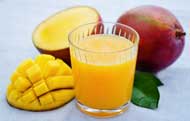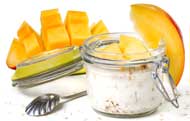





1. Mango Facts
2. Types of Mango
3. Nutritional Value of Mango
4. Health Benefits of Mango
Mangifera indica is a large green tree, valued mainly for its fruits, both green and ripe. Approximately 500–1000 varieties have been identified, named, or reported, primarily in India. It can grow up to 15–30 metres (50–100 feet) tall with a similar crown width and a trunk circumference of more than 3.7 m (12 ft). The leaves are simple, shiny and dark green. The trees take 2–4 years from planting time to first harvest and can have a productive life of over 50 years.
Yellow-white fragrant flowers appear at the end of winter through the beginning of spring, varying with location. Both male and female flowers are borne on the same tree. Climatic conditions have a significant influence on the time of flowering.
The mango is an irregular, egg-shaped fruit which is a fleshy drupe. Mangos are typically 8–12 centimetres (3–5 inches) long and greenish yellow in colour. The fruits can be round, oval, heart, or kidney shaped. Mango fruits are green when they are unripe. The interior flesh is bright orange and soft with a large, flat pit in the middle. Mangos are mature in April and May. Raw mangos can be used in the making of pickles and chutneys. Ripe mangos are a popular fruit throughout the world. The skin and pulp account for 85% of the mango's weight, and the remaining 15% comes from the stone (seed).
History and Origin
Mangoes originated in the region between northeastern India, Bangladesh, and Myanmar and have been cultivated for over 4,000 years. From there, they spread to Southeast Asia and then later to other tropical and subtropical regions, being introduced to the Americas in the 18th century. Today, the two main types are the "Indian type" and the "Southeast Asian type," with the species now grown globally in suitable climates.
- • Kensington Pride
- • R2E2
- • Calypso
- • Honey Gold
- • Keitt
- • Palmer
- • Kent
- • Brooks
- • Maha Bliss
- • Lady Jane
- • Lady Grace
The main types of mangoes grown and sold in Australia are Kensington Pride, R2E2, Calypso, Honey Gold, and Keitt. While Kensington Pride is the most popular, others like R2E2 and Calypso are also widely available, with seasonal varieties like Palmer, Kent, Brooks, and others filling out the supply.
Major commercial varieties
Kensington Pride: The most popular variety in Australia, known for its sweet and tangy flavour. It is sometimes called the Bowen or Bowen special mango.
R2E2: A large, round mango with firm, sweet, and slightly exotic-tasting yellow flesh.
Calypso: A variety with a small seed and a deep orange skin.
Honey Gold: Known for its firm, fibreless, juicy flesh and brilliant golden apricot skin.
Keitt: A late-season variety.
Other varieties
Palmer: A sweet variety with firm, all-over dark red blush skin.
Kent: An oval-shaped, late-season variety with multi-coloured red skin.
Brooks: A less common, late-season variety.
Maha Bliss: An Australian clone of a Thai mango, available in limited supply, known for its sweetness and small seed.
Lady Jane: and Lady Grace: Newer, commercially planted varieties developed in Australia.
Fruit ” Mango ” ( Nutritional value )
Nutritional value per 100 g
Mangos, raw
|
Nutrient ( Proximate’s )
|
Unit
|
Value
|
Daily Value %
|
|
Energy
|
kcal
|
60
|
3%
|
|
Protein
|
g
|
0.82
|
1.6%
|
|
Total lipid (fat)
|
g
|
0.38
|
0.4%
|
|
Carbohydrate, by difference
|
g
|
14.98
|
5.4%
|
|
Fiber, total dietary
|
g
|
1.6
|
5.7%
|
|
Sugars, total
|
g
|
13.66
|
|
|
Minerals
|
|||
|
Calcium, Ca
|
mg
|
11
|
0.8%
|
|
Iron, Fe
|
mg
|
0.16
|
0.8%
|
|
Magnesium, Mg
|
mg
|
10
|
2.3%
|
|
Phosphorus, P
|
mg
|
14
|
1.1%
|
|
Potassium, K
|
mg
|
168
|
3.5%
|
|
Sodium, Na
|
mg
|
1
|
0.04%
|
|
Zinc, Zn
|
mg
|
0.09
|
0.8%
|
|
Copper, Cu
|
mg
|
0.111
|
12.3%
|
|
Manganese, Mn
|
mg
|
0.063
|
2.7%
|
|
Selenium, Se
|
mcg
|
0.6
|
1.0%
|
|
Vitamins
|
|||
|
Vitamin C, total ascorbic acid
|
mg
|
36.4
|
40.4%
|
|
Thiamin (B-1)
|
mg
|
0.028
|
2.3%
|
|
Riboflavin (B-2)
|
mg
|
0.038
|
2.9%
|
|
Niacin (B-3)
|
mg
|
0.669
|
4.1%
|
|
Pantothenic acid (B-5)
|
mg
|
0.197
|
3.9%
|
|
Vitamin B-6
|
mg
|
0.119
|
6.9%
|
|
Vitamin B-12
|
mg
|
0.00
|
|
|
Folate DFE (dietary folate) (B-9)
|
mcg
|
43
|
10.7%
|
|
Vitamin A, RAE (retinol)
|
mcg
|
54
|
6%
|
|
Vitamin E (alpha-tocopherol)
|
mg
|
0.90
|
6.0%
|
|
Vitamin D (D2 + D3)
|
mcg
|
0
|
|
|
Vitamin K (phylloquinone)
|
mcg
|
4.2
|
3.5%
|
|
Lipids
|
|||
|
Saturated Fatty Acids
|
g
|
0.092
|
0.4%
|
|
Monounsaturated Fatty Acids
|
g
|
0.140
|
|
|
Polyunsaturated Fatty Acids
|
g
|
0.071
|
|
|
Trans Fatty Acids
|
g
|
0.000
|
|
|
Carotenoids
|
|||
|
Beta-Carotene
|
mcg
|
640
|
|
|
Alpha-Carotene
|
mcg
|
9
|
|
|
Beta-Cryptoxanthin
|
mcg
|
10
|
|
|
Lycopene
|
mcg
|
3
|
|
|
Lutein + zeaxanthin
|
mcg
|
23
|
|

|
Reference Values are based on a 2,000 Calorie Intake, for Adults and Children 4 or More Years of Age. Your daily values may be higher or lower depending on your calorie needs.
|
|
Percentages are roughly approximated using (RDA) Recommended Dietary Allowances for adults. Source: Nutrient Database – USDA (United States Department of Agriculture)
|
|
Reference Values for Nutrition – FDA U.S. Food and Drug Administration
|
Mango Nutritional Value
Mangoes provide various health benefits, including boosting the immune system with high levels of vitamin C, improving digestive health with fiber and digestive enzymes, supporting heart health through potassium and other antioxidants, and aiding in weight management by promoting fullness. They also support vision and skin health with vitamin A and are beneficial during pregnancy due to their folate content.
- RICH IN NUTRIENTS AND ANTIOXIDANTS
Mangoes are nutrient-rich, containing vitamins like A and C, and are packed with antioxidants, fiber, and minerals like potassium. This combination supports immune function, eye health, and can help protect against cell damage caused by free radicals. They also offer benefits for digestive health due to their fiber and amylase content. - BLOOD SUGAR MANAGEMENT
Mangoes can support blood sugar management by improving insulin sensitivity due to their fiber content, which slows sugar absorption, and antioxidants. Studies suggest that regular mango consumption can improve both short- and long-term blood glucose control, particularly in individuals with prediabetes or obesity, but it's important to consume them in moderation as part of a balanced diet. - BOOSTS HEART HEALTH
Mangoes boost heart health by providing essential nutrients like magnesium and potassium, which help maintain healthy blood pressure and blood flow. The fruit's fiber helps lower "bad" cholesterol, while its antioxidants and other compounds like mangiferin may reduce inflammation and oxidative stress, both of which are linked to heart disease. - DIGESTIVE HEALTH
Mangoes support digestive health due to their digestive enzymes (amylase), which break down large food molecules, and their high content of water and dietary fiber, which helps regulate bowel movements and prevent both constipation and diarrhoea. Additionally, studies suggest that mangoes may be more effective than fiber supplements alone in improving constipation symptoms. - PREGNANCY
Mangoes are rich in nutrients like folate, vitamin C, and fiber that support foetal development and maternal health, like reducing neural tube defects and preventing constipation. However, consume them in moderation due to high sugar content, avoid artificially ripened mangoes, and be aware of potential high calories from processed products like juices and desserts.

- SUPPORTS SKIN AND HAIR
Mangoes support skin and hair health primarily through their high content of vitamins A and C, which promote collagen production, increase skin elasticity, and protect against damage. Vitamin A nourishes the scalp and supports sebum production, while vitamin C is crucial for collagen and aids in iron absorption for hair growth. Other beneficial compounds include antioxidants to reduce damage and fatty acids and vitamin E to promote shine and scalp circulation. - SUPPORTS IMMUNE HEALTH
Mangoes support immune health due to their high levels of vitamin C and beta-carotene, which act as antioxidants and boost the production of white blood cells. The fruit also contains other vitamins like A and E, along with magnesium, potassium, and beneficial phytochemicals, all of which contribute to a strong and healthy immune system. - PROMOTES EYE HEALTH
Mangoes promote eye health due to their high content of Vitamin A, beta-carotene, lutein, and zeaxanthin. These nutrients support vision, particularly in low light, and protect the retina from harmful blue light and oxidative stress that can lead to age-related macular degeneration and cataracts. - AIDS DIGESTIVE HEALTH
Mangoes aid digestive health due to their fiber content, digestive enzymes, and prebiotics, which can promote regular bowel movements, feed beneficial gut bacteria, and help break down complex carbohydrates. They also contain polyphenols with anti-inflammatory properties that may protect against gut-related inflammation. - WEIGHT MANAGEMENT
Mangoes can support weight management when consumed in moderation, as they are a nutrient-dense fruit rich in fiber and low in calories, which promotes fullness and helps control hunger. The key is portion control (about one cup or 165g per day) and combining mango with protein and healthy fats to manage blood sugar levels. Avoid excessive amounts of dried mango, which is much higher in calories and sugar.
References
Nutrient Database – USDA (United States Department of Agriculture)
Reference Values for Nutrition – FDA U.S. Food and Drug Administration
Rich in nutrients and antioxidants - Mangoes are nutrient-rich, containing vitamins like A and C, and are packed with antioxidants, fiber, and minerals like potassium. This combination supports immune function, eye health, and can help protect against cell damage caused by free radicals. They also offer benefits for digestive health due to their fiber and amylase content.
Supports immune health - Mangoes support immune health due to their high levels of vitamin C and beta-carotene, which act as antioxidants and boost the production of white blood cells. The fruit also contains other vitamins like A and E, along with magnesium, potassium, and beneficial phytochemicals, all of which contribute to a strong and healthy immune system.
Aids digestive health - Mangoes aid digestive health due to their fiber content, digestive enzymes, and prebiotics, which can promote regular bowel movements, feed beneficial gut bacteria, and help break down complex carbohydrates. They also contain polyphenols with anti-inflammatory properties that may protect against gut-related inflammation.
Supports skin and hair - Mangoes support skin and hair health primarily through their high content of vitamins A and C, which promote collagen production, increase skin elasticity, and protect against damage. Vitamin A nourishes the scalp and supports sebum production, while vitamin C is crucial for collagen and aids in iron absorption for hair growth. Other beneficial compounds include antioxidants to reduce damage and fatty acids and vitamin E to promote shine and scalp circulation.
Boosts heart health - Mangoes boost heart health by providing essential nutrients like magnesium and potassium, which help maintain healthy blood pressure and blood flow. The fruit's fiber helps lower "bad" cholesterol, while its antioxidants and other compounds like mangiferin may reduce inflammation and oxidative stress, both of which are linked to heart disease.
Digestive health - Mangoes support digestive health due to their digestive enzymes (amylase), which break down large food molecules, and their high content of water and dietary fiber, which helps regulate bowel movements and prevent both constipation and diarrhea. Additionally, studies suggest that mangoes may be more effective than fiber supplements alone in improving constipation symptoms.
Weight management - Mangoes can support weight management when consumed in moderation, as they are a nutrient-dense fruit rich in fiber and low in calories, which promotes fullness and helps control hunger. The key is portion control (about one cup or 165g per day) and combining mango with protein and healthy fats to manage blood sugar levels. Avoid excessive amounts of dried mango, which is much higher in calories and sugar.
Blood sugar management - Mangoes can support blood sugar management by improving insulin sensitivity due to their fiber content, which slows sugar absorption, and antioxidants. Studies suggest that regular mango consumption can improve both short- and long-term blood glucose control, particularly in individuals with prediabetes or obesity, but it's important to consume them in moderation as part of a balanced diet.
Pregnancy - Yes, you can eat mangoes during pregnancy, as they are rich in nutrients like folate, vitamin C, and fiber that support foetal development and maternal health, like reducing neural tube defects and preventing constipation. However, consume them in moderation due to high sugar content, avoid artificially ripened mangoes, and be aware of potential high calories from processed products like juices and desserts.
